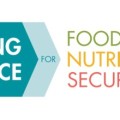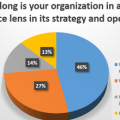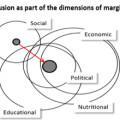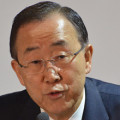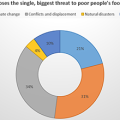In 2012, the world was home to about 28 million people who had fled their home region or country, and most of these people were hosted in developing countries. These refugees and internally displaced people (IDPs) have tended to be the focus of publicity and relief efforts—but what happens to the resilience and food security >> Read more
Knowledge Fair Participant Poll: Day 2 Results
1. Is resilience a useful concept or just a buzzword in development? (Yes= resilience is useful concept; No= resilience is buzzword) 2. How far along is your organization in adopting a resilience lens in its strategy and operation?
Highlights from Conference Brief 15- “Resilience and Exclusion: Development Policy Implications”
A new conference brief by Joachim von Braun and Sukhadeo Thorat makes the case that overcoming exclusion is a complex political agenda with legal, cultural, social, economic, technological, and governance dimensions. Exclusion is a global phenomenon, not just one of developing countries, the authors note, and is fundamentally a human rights issue. Exclusion quite often erodes the resilience capacity of social groups. It brings about unequal access to public services, making excluded people’s efforts to overcome shocks more difficult than those of their counterparts from nonexcluded groups. Moreover, resilience and exclusion are in a vicious dynamic relationship over time. Typically, social exclusion perpetuates the effects of shocks and thereby undermines resilience. The socially excluded groups may collapse or converge to a worse-off steady state after disruptions, taking a protracted time to recover from shocks.
Building a green and resilient economy in Ethiopia
“For us, anticipating, adapting to, and recovering from shocks are essential to our future.” With those words, H. E. Hailemariam Dessalegn, Prime Minister of Ethiopia, highlighted the importance of resilience for his country. In his inaugural address at the opening of the 2020 Conference on “Building Resilience for Food and Nutrition Security” Thursday evening, >> Read more
Strengthened resilience can help end hunger
Shocks, whether man-made or natural in origin, are a fact of life for citizens of both the developed and developing world. Building resilience in the face of growing threats such as extreme weather events, rising and highly volatile food prices, and the effects of global climate change is more important than ever. If we are >> Read more
Video remarks from Rajiv Shah, Administrator, United States Agency For International Development (USAID)
Video remarks from David Nabarro, United Nations Secretary General Special Representative on Food Security and Nutrition
Video remarks from United Nations Secretary General, Ban Ki-moon
Video remarks from H.E. John Kufuor, Former President, Republic of Ghana
Knowledge Fair Participant Poll: Day 1 Results
1. Which of these shocks poses the single, biggest threat to poor people's food and nutrition security? 2. Is there a difference between resilience and vulnerability?
- « Previous Page
- 1
- 2
- 3
- 4
- 5
- 6
- …
- 10
- Next Page »

